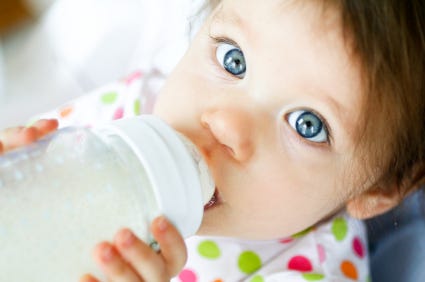FDA bans BPA in baby bottles and sippy cups
BPA can no longer be used in the manufacture of baby bottles and sippy cups, the Food and Drug Administration announced Tuesday.The American Chemistry Council (ACC) in October 2011 asked the FDA to revise certain regulations on BPA to clarify for consumers that BPA is no longer used to manufacture baby bottles and sippy cups and will not be used in these products in the future.
July 17, 2012
BPA can no longer be used in the manufacture of baby bottles and sippy cups, the Food and Drug Administration announced Tuesday.
The American Chemistry Council (ACC) in October 2011 asked the FDA to revise certain regulations on BPA to clarify for consumers that BPA is no longer used to manufacture baby bottles and sippy cups and will not be used in these products in the future.
BPA is a synthetic estrogen used to produce polycarbonate (PC) polymers and epoxy resins. The chemical has faced controversy due to studies linking BPA to an array of adverse health effects, including cancer, obesity, abnormal brain development and reproductive problems.
 "Although governments around the world continue to support the safety of BPA in food contact materials, confusion about whether BPA is used in baby bottles and sippy cups had become an unnecessary distraction to consumers, legislators and state regulators," said Steven Hentges of the Polycarbonate/BPA Global Group of ACC, in the news release. "FDA action on this request now provides certainty that BPA is not used to make the baby bottles and sippy cups on store shelves, either today or in the future."
"Although governments around the world continue to support the safety of BPA in food contact materials, confusion about whether BPA is used in baby bottles and sippy cups had become an unnecessary distraction to consumers, legislators and state regulators," said Steven Hentges of the Polycarbonate/BPA Global Group of ACC, in the news release. "FDA action on this request now provides certainty that BPA is not used to make the baby bottles and sippy cups on store shelves, either today or in the future."
Canada, the European Union, China, and five other countries as well as 11 U.S. states have prohibited the use of BPA in children's products.
State legislative and regulatory actions across the country had contributed to confusion about whether baby bottles and sippy cups sold in the United States contain BPA. In fact, manufacturers of baby bottles and sippy cups announced several years ago that due to consumer preference they had stopped using BPA in these products.
While some food manufacturers have voluntarily removed BPA from can linings, its use remains legal in all canned food and beverage packaging.
Earlier this year, the FDA denied a petition from the Natural Resources Defense Council (NRDC) to ban BPA in food
BPA in FocusPlasticsToday and sister publication Packaging Digest have combined resources for a comprehensive report on bisphenol A (BPA), including its history and future, as it relates to packaging. |
packaging earlier saying the "most appropriate course of action at this time is to continue scientific study and review of all new evidence regarding the safety of BPA."
This past March, Congressman Ed Markey (D-MA) petitioned the FDA to remove regulatory approval for BPA in three items: baby and toddler food packaging, small reusable household containers and canned food packaging.
The FDA accepted Markey's petition regarding BPA in infant formula containers, but denied the petition as it related to small reusable containers and canned food packaging. The agency has filed the infant formula petition in the Federal Register to collect and review public comments on the petition, and then propose a final ruling.
Dr. Sarah Janssen, senior scientist in the public health program at NRDC, calls the FDA ruling on baby bottles and sippy cups "only a baby step in the fight to eradicate BPA."
"To truly protect the public, FDA needs to ban BPA from all food packaging," she said. "This half-hearted action, taken only after consumers shifted away from BPA in children's products, is inadequate. FDA continues to dodge the bigger questions of BPA's safety."
About the Author(s)
You May Also Like


